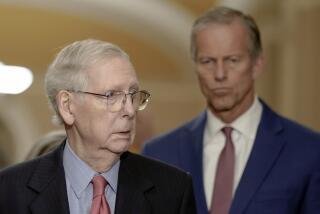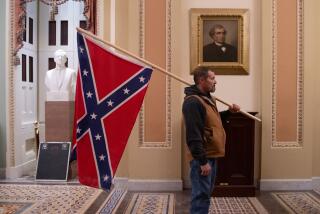How Khizr and Ghazala Khan went from grieving parents to stars of the presidential race
For all the scripting and stage managing that goes into political conventions, the moments that can change a race are often unanticipated.
Khizr Khan’s speech at the Democratic National Convention last week in Philadelphia was one such moment.
For the record:
12:36 p.m. April 24, 2024An earlier version of this story said Humayun Khan was an enlisted soldier. He was an Army captain.
Convention organizers knew Khan would be a powerful speaker, but they had not expected he would be a considerably more potent symbol for the campaign than the other “everyday Americans” invited to the stage — and everyone else who appeared in Philadelphia.
Long after Americans have forgotten the nearly hourlong address Hillary Clinton delivered while accepting her party’s nomination, what will linger is the haunting, emotionally charged plea to Donald Trump from a Muslim father whose son, an Army captain, was killed by a suicide bomber in Baghdad.
Timeline: The Khan family’s road to confrontation with Donald Trump »
The Clinton campaign is doing its best to just step aside and let the story play out, as Khan and his wife, Ghazala, are proving more effective at inflicting damage on Trump independently than the campaign’s official surrogates ever could be. Clinton didn’t mention the Khans during a rally in Omaha on Monday, though top Republicans and the families of other fallen soldiers have rushed to condemn Trump’s condemnation of the Khans. The feud has grown into a full-blown political mess for the Republican nominee.
During Khan’s speech Thursday night, he lacerated Trump’s plan to ban Muslims from entering the U.S. by speaking of personal sacrifice that, he said, Trump could not possibly know. Then he pulled out a pocket copy of the Constitution and asked Trump if he had ever even read it. Since then, thanks in part to Trump’s complaints about the Khans, the family’s story has dominated the news cycle.
The Clinton campaign became aware of Khan in December, when it came across an interview he did with Vocativ, a site that promotes itself as mining the “deep Web” — chat rooms and databases outside the grasp of Google searches — for original story angles.
The article was titled “The Father of a Muslim War Hero Has This to Say About Donald Trump.” It told the story of Khan’s son, Humayun, one of the 14 American Muslims who died serving in the military in the decade that followed the Sept. 11 attacks. Trump had recently called for a ban on Muslims entering the country.
Khan made a comment in the article that caught the attention of Clinton’s headquarters in Brooklyn, N.Y., about the 10 steps his son had taken toward the car of the suicide bombers as he warned all of the other men to hit the dirt and take cover. “Those 10 steps told us we did not make a mistake in moving to this country,” Khan told Vocativ. “These were the values we wanted to adopt. Not religious values, human values.”
Days after the Vocativ article was published, Clinton would come to read Khan’s words about the 10 steps in a speech in Minneapolis in which she repudiated Trump.
Khan describes himself as a political independent who votes for both Democrats and Republicans. The first time he had heard from the Clinton campaign was when it called to say the candidate wanted to quote him to pay tribute to his son.
“Which father is going to say, ‘No, you cannot do this’?” Khan said in an interview on PBS on Monday.
Clinton’s December speech, in which she quoted Khan extensively, was well-received. But voting in the primaries had not yet begun, and Trump was leading a field that still consisted of 14 Republicans running for their party’s nomination.
After Trump had sewn up the nomination, and Democrats began to consider convention speakers, Khan’s name was among the first on the list of “everyday Americans” they would like to invite. As the event neared, they called him.
“They asked if me and Mrs. Khan would come to say a word or two,” Khizr Khan said. “I don’t know what was in their minds, but that is how it came into being.”
Trump has since accused the Khans of being shills for the Clinton campaign and of reading its scripted text. Not so, Khan said. He wrote the speech with his wife. Clinton’s staff eventually read it, but the edits were all done by the Khans.
“We were not tricked,” Khan said during the PBS interview with him and his wife. That memorable moment when Khan brandished a pocket copy of the Constitution was his own idea, he said.
“I carry this in my pocket out of affection for this document,” said Khan, who holds a Harvard Law degree and resides in Charlottesville, Va. “At home we have a stack of it sitting. Any time a guest comes, we give them a copy of it. It’s a good starting of conversation. We live under the shadow of Thomas Jefferson. And I point that out.”
Khan said he figured he’d leave his copy at home when he headed to the convention, to avoid the hassle of going through security with it. “That’s when the thought came: Why don’t I pull it out” during the speech?
In Khan’s mind, the discussion the speech has spurred about Trump’s proposed Muslim ban was just one reason it was a success. Khan is also delighted by how much interest it has generated in pocket copies of the Constitution, which have been selling like mad thanks to him. “They have never sold that many copies of the Constitution ever, ever.”
Follow me: @evanhalper
Despite Donald Trump cementing the GOP nomination, the Koch network keeps its distance
More to Read
Get the L.A. Times Politics newsletter
Deeply reported insights into legislation, politics and policy from Sacramento, Washington and beyond. In your inbox three times per week.
You may occasionally receive promotional content from the Los Angeles Times.







